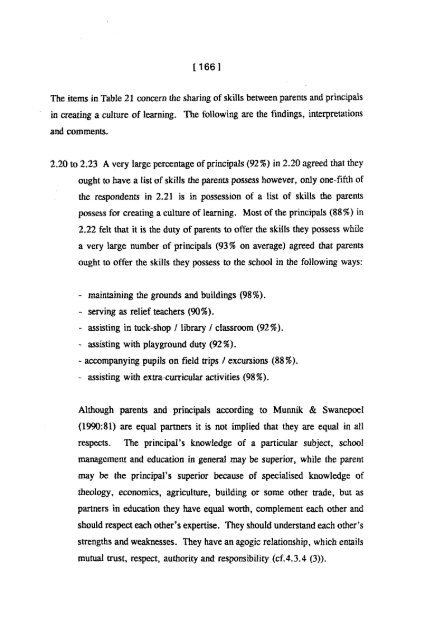parents and principals as partners in creating a culture of learning
parents and principals as partners in creating a culture of learning
parents and principals as partners in creating a culture of learning
You also want an ePaper? Increase the reach of your titles
YUMPU automatically turns print PDFs into web optimized ePapers that Google loves.
[1661<br />
The items <strong>in</strong> Table 21 concern the shar<strong>in</strong>g <strong>of</strong> skills between <strong>parents</strong> <strong>and</strong> <strong>pr<strong>in</strong>cipals</strong><br />
<strong>in</strong> creat<strong>in</strong>g a <strong>culture</strong> <strong>of</strong> learn<strong>in</strong>g. The follow<strong>in</strong>g are the f<strong>in</strong>d<strong>in</strong>gs, <strong>in</strong>terpretations<br />
<strong>and</strong> comments.<br />
2.20 to 2.23 A very large percentage <strong>of</strong><strong>pr<strong>in</strong>cipals</strong> (92 %) <strong>in</strong> 2.20 agreed that they<br />
ought to have a list <strong>of</strong> skills the <strong>parents</strong> possess however, only one-fifth <strong>of</strong><br />
the respondents <strong>in</strong> 2.21 is <strong>in</strong> possession <strong>of</strong> a list <strong>of</strong> skills the <strong>parents</strong><br />
possess for creat<strong>in</strong>g a <strong>culture</strong> <strong>of</strong> learn<strong>in</strong>g. Most <strong>of</strong> the <strong>pr<strong>in</strong>cipals</strong> (88 %) <strong>in</strong><br />
2.22 felt that it is the duty <strong>of</strong> <strong>parents</strong> to <strong>of</strong>fer the skills they possess while<br />
a very large number <strong>of</strong> <strong>pr<strong>in</strong>cipals</strong> (93 % on average) agreed that <strong>parents</strong><br />
ought to <strong>of</strong>fer the skills they possess to the school <strong>in</strong> the follow<strong>in</strong>g ways:<br />
- ma<strong>in</strong>ta<strong>in</strong><strong>in</strong>g the grounds <strong>and</strong> build<strong>in</strong>gs (98 %).<br />
- serv<strong>in</strong>g <strong>as</strong> relief teachers (90%).<br />
- <strong>as</strong>sist<strong>in</strong>g <strong>in</strong> tuck-shop I library I cl<strong>as</strong>sroom (92%).<br />
- <strong>as</strong>sist<strong>in</strong>g with playground duty (92 %).<br />
- accompany<strong>in</strong>g pupils on field trips I excursions (88%).<br />
- <strong>as</strong>sist<strong>in</strong>g with extra-curricular activities (98 %).<br />
Although <strong>parents</strong> <strong>and</strong> <strong>pr<strong>in</strong>cipals</strong> accord<strong>in</strong>g to Munnik & Swanepoel<br />
(1990:81) are equal <strong>partners</strong> it is not implied that they are equal <strong>in</strong> all<br />
respects. The pr<strong>in</strong>cipal's knowledge <strong>of</strong> a particular subject, school<br />
management <strong>and</strong> education <strong>in</strong> general may be superior, while the parent<br />
may be the pr<strong>in</strong>cipal's superior because <strong>of</strong> specialised knowledge <strong>of</strong><br />
theology, economics, agri<strong>culture</strong>, build<strong>in</strong>g or some other trade, but <strong>as</strong><br />
<strong>partners</strong> <strong>in</strong> education they have equal worth, complement each other <strong>and</strong><br />
should respect each other's expertise. They should underst<strong>and</strong> each other's<br />
strengths <strong>and</strong> weaknesses. They have an agogic relationship, which entails<br />
mutual trust, respect, authority <strong>and</strong> responsibility (cf.4.3.4 (3».

















